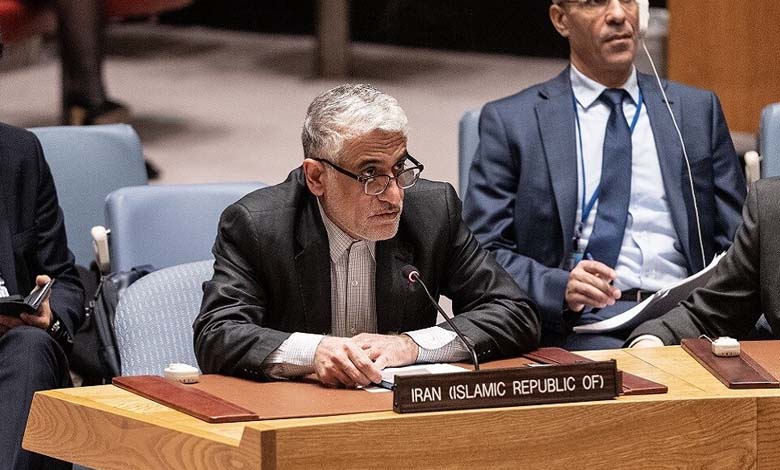In a Letter to the Security Council.. The U.S. Justifies Strikes on Iran with Three Objectives

In a letter addressed to the UN Security Council, Washington defended its recent strikes on Iran as an act of collective self-defense under the United Nations Charter.
-
Trump Announces Ceasefire Between Israel and Iran
-
Behind Trump’s Deal: How Iran and Israel Agreed to End the War
The United States informed the Security Council in a letter reviewed by Reuters on Friday that the aim of last week’s airstrikes on Iran was “to destroy Iran’s ability to enrich uranium and prevent the threat posed by this regime acquiring and using a nuclear weapon.”
Dorothy Shea, Acting Permanent Representative of the United States to the UN, wrote: “The United States remains committed to pursuing an agreement with the Iranian government.”
-
Energy Investments: Iran’s New Card to Woo Trump and End Sanctions
-
Trump’s Pressure Pushes Iran to Accept U.S. Demands on Nuclear File
Self-defense argument
Washington invoked Article 51 of the UN Charter to justify the strikes, describing them as collective self-defense. The article requires UN member states to report immediately any measures taken in self-defense against an armed attack.
Earlier in the day, President Donald Trump said he would consider striking Iran again if Tehran enriched uranium to levels that concerned the United States.
-
Iran’s Nuclear Program Back in the Spotlight… and Trump Seeks Political Breakthrough
-
Between Escalation and De-escalation: How Will Trump Handle Iran?
Iran’s Supreme Leader Ali Khamenei strongly criticized Trump‘s comments and ruled out any plan to ease sanctions on Iran. He said he would consider further retaliation if uranium enrichment continued at alarming levels.
Trump responded forcefully to Khamenei’s remarks—his first after a 12-day conflict with Israel that ended with U.S. airstrikes targeting Iranian nuclear facilities earlier in the week.
-
Trump and Iran: 4 Possible Scenarios, Including “Shock and Awe”
-
Trump’s Return Pushes European Powers to Demand Increased Pressure on Iran
Trump issues threats
Khamenei claimed that Iran had “slapped America in the face” by launching an attack on a major U.S. base in Qatar following the airstrikes. He affirmed that Iran would never surrender.
Trump, in turn, claimed he had saved Khamenei’s life. U.S. officials told Reuters on June 15 that Trump had opposed an Israeli plan to assassinate the Iranian leader.
In a social media post, Trump wrote: “His country is destroyed, his three evil nuclear sites are gone, I knew exactly where he was, but I did not allow Israel or the United States Armed Forces—the greatest and most powerful in the world—to end his life.”
-
Iran Keeps Door Open for Dialogue with Trump and Prepares for New Sanctions
-
Trump Denies Seeking to Fund Iran’s Civil Nuclear Project
Trump stated that in recent days he had been working to ease sanctions on Iran to give it a chance to recover quickly, but has now reversed course. “I was shocked by his hateful and angry comments, and I immediately stopped all efforts to lift sanctions—and more,” he added.
During a White House press conference, Trump did not rule out future attacks on Iran. When asked about the possibility of striking additional nuclear sites, he replied: “Certainly, no doubt.”
-
Iran’s Mount Fass: A Nuclear Stronghold Deeper Than Fordo and Natanz
-
Unprecedented Announcement: Israeli Commandos Operated Inside Iran
Nuclear inspections at risk
Regarding Iran’s nuclear facilities, Trump said he wanted inspectors from the International Atomic Energy Agency—or another respected source—to examine the sites hit in the recent strikes. He stated that the facilities had been “wiped out,” rejecting any suggestion that the damage was limited.
On Wednesday, IAEA Director Rafael Grossi said resuming inspections was his top priority, as none had taken place since Israel began its bombing campaign on June 13.
-
Trump: America Saved Israel and Will Protect Netanyahu from the Trial Farce
-
Washington denies transfer of Iranian enriched uranium before U.S. strike
However, Iran’s parliament approved steps on the same day to suspend inspections.
Iranian Foreign Minister Abbas Araghchi signaled that Tehran may reject any request by the agency’s chief to visit its nuclear sites.
Finally, Trump said he no longer believed Iran was willing to continue pursuing nuclear weapons following the U.S.-Israeli strikes.












